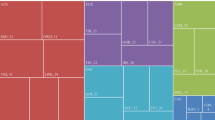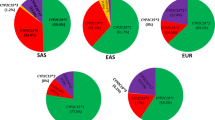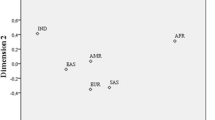Abstract
Drug gene polymorphisms are strongly associated with disease. Previous studies have shown that the frequency of drug genes varies in different populations. At present, there are no reports about the polymorphism of the drug genome in the Zhuang population in southern China. This study conducted a pharmacogenomics study on the Zhuang population in southern China. Therefore, we conducted genotyping on 105 Zhuang samples, and compared the genotyping results with those of other 11 ethnic groups after statistical analysis. Our results show that, compared with the 11 populations in the HapMap data set, the differences between the CYP2E1 rs2070676 and CYP2D6 rs1065852 of the Zhuang nationality are the largest. This study fills in the blank of the drug genome information of the Zhuang nationality in southern China. The two sites of Rs2070676 (CYP2E1) and rs1065852 (CYP2D6) provide a reliable basis for the prediction of the efficacy of certain drugs. Its main purpose is to provide theoretical basis for safe drug use in the Zhuang region of southern China.
This is a preview of subscription content, access via your institution
Access options
Subscribe to this journal
Receive 6 print issues and online access
$259.00 per year
only $43.17 per issue
Buy this article
- Purchase on Springer Link
- Instant access to full article PDF
Prices may be subject to local taxes which are calculated during checkout



Similar content being viewed by others
References
Ingelman-Sundberg M. Genetic polymorphisms of cytochrome P450 2D6 (CYP2D6): clinical consequences, evolutionary aspects and functional diversity. Pharmacogenom J. 2005;5:6–13.
Jin T, Shi X, Li W, Wang H, Tian F, Kang L. Genetic polymorphisms of pharmacogenomic VIP variants in the Mongol of Northwestern China. BMC Genet. 2016;17:70.
He Y, Yang H, Geng T, Feng T, Yuan D, Kang L, et al. Genetic polymorphisms of pharmacogenomic VIP variants in the lhoba population of southwest China. Int J Clin Exp Pathol. 2015;8:13293.
Jin T, Zhao R, Shi X, He N, He X, Ouyang Y, et al. Genetic polymorphisms study of pharmacogenomic VIP variants in Han ethnic of China’s Shaanxi province. Environ Toxicol Pharmacol. 2016;46:27–35.
Szekanecz Z, Meskó B, Poliska S, Váncsa A, Szamosi S, Végh E, et al. Pharmacogenetics and pharmacogenomics in rheumatology. High Blood Press Cardiovasc Prev Off J Ital Soc Hypertens. 2013;56:325–33.
Weinshilboum R. Inheritance and drug response. N Engl J Med. 2003;348:529–37.
Evans WE. Pharmacogenomics: marshalling the human genome to individualise drug therapy. Gut. 2003;52(Suppl 2):ii10.
Administration FUD. FDA clears genetic test that advances personalized medicine: test helps determine safety of drug therapy. J Clin Eng. 2005;30:205–6.
Whirl-Carrillo M, Mcdonagh EM, Hebert JM, Gong L, Sangkuhl K, Thorn CF, et al. Pharmacogenomics knowledge for personalized medicine. Clin Pharmacol Ther. 2012;92:414.
Sangkuhl K, Berlin DS, Altman RB, Klein TE. PharmGKB: understanding the effects of individual genetic variants. Drug Metab Rev. 2008;40:539.
Sim SC, Altman RB, Ingelmansundberg M. Databases in the area of pharmacogenetics. Hum Mutat. 2011;32:526–31.
Badagnani I, Sorani M, Edwards RH, Brown C, Castro RA, Huang CC, et al. PharmGKB submission update: VI. PMT submissions of genetic variations in neurotransmitter transporters (SLC6, SLC17, and SLC18) to the PharmGKB network. Pharmacol Rev. 2006;58:5–6.
Yunus Z, Liu L, Wang H, Zhang L, Li X, Geng T, et al. Genetic polymorphisms of pharmacogenomic VIP variants in the Kyrgyz population from northwest China. Gene. 2013;529:88–93.
Yan M, Li D, Zhao G, Li J, Niu F, Li B, et al. Genetic polymorphisms of pharmacogenomic VIP variants in the Yi population from China. Gene. 2018;648:54–62.
Wang L, Aikemu A, Yibulayin A, Du S, Geng T, Wang B, et al. Genetic polymorphisms of pharmacogenomic VIP variants in the Uygur population from northwestern China. BMC Genet. 2015;16:66.
Thomas RK, Baker AC, Debiasi RM, Winckler W, Laframboise T, Lin WM, et al. High-throughput oncogene mutation profiling in human cancer. Nat Genet. 2007;39:347–51.
Song MK, Lin FC, Ward SE, Fine JP. Composite variables: when and how. Nurs Res. 2013;62:45–49.
Excoffier L, Laval G, Schneider S. Arlequin (version 3.0): an integrated software package for population genetics data analysis. Evol Bioinform Online. 2005;1(4A):47–50.
Falush D, Stephens M, Pritchard JK. Inference of population structure using multilocus genotype data: dominant markers and null alleles. Mol Ecol Notes. 2007;7:574–8.
Gonzalez FJ. The 2006 Bernard B. Brodie Award Lecture. Cyp2e1. Drug Metab Dispos. 2007;35:597–8.
Caro AA, Cederbaum AI. Oxidative stress, toxicology, and pharmacology of CYP2E1. Annu Rev Pharmacol Toxicol. 2004;44:27–42.
Sompon W, Kamonrat P, Virapong P. Cytochrome P450 enzyme mediated herbal drug interactions (Part 2). Excli J. 2014;13:869–96.
Abdelmegeed MA, Banerjee A, Jang S, Yoo SH, Yun JW, Gonzalez FJ, et al. CYP2E1 potentiates binge alcohol-induced gut leakiness, steatohepatitis, and apoptosis. Free Radic Biol Med. 2013;65:1238–45.
Lieber CS. The discovery of the microsomal ethanol oxidizing system and its physiologic and pathologic role. Drug Metab Rev. 2004;36:511–29.
Liao L, Zhang H, Lai MP, Chen SL, Wu M, Shen N. Single-nucleotide polymorphisms and haplotype of CYP2E1 gene associated with systemic lupus erythematosus in Chinese population. Arthritis Res Ther. 2011;13:R11.
Trafalis DT, Panteli ES, Grivas A, Tsigris C, Karamanakos PN. CYP2E1 and risk of chemically mediated cancers. Expert Opin drug Metab Toxicol. 2010;6:307–19.
Chang LS, Hsu YW, Lu CC, Lo MH, Hsieh KS, Li SC, et al. CYP2E1 gene polymorphisms related to the formation of coronary artery lesions in Kawasaki disease. Pediatr Infect Dis J. 2017;36:1039.
Shahabi HN, Westberg L, Melke J, Håkansson A, Belin AC, Sydow O, et al. Cytochrome P450 2E1 gene polymorphisms/haplotypes and Parkinson’s disease in a Swedish population. J Neural Transm. 2009;116:567–73.
Polonikov AV, Ivanov VP, Solodilova MA. CYP2E1 gene promoter polymorphism -1293G>C increases the risk of essential hypertension in men with alcohol abuse. Bull Exp Biol Med. 2013;155:734–7.
Wang L, Ren G, Li J, Zhu L, Niu F, Yan M, et al. Genetic polymorphism analysis of cytochrome P4502E1 (CYP2E1) in a Chinese Tibetan population. Medicine. 2017;96:e8855.
Zhang C, Jiang X, Chen W, Li Q, Yun F, Yang X, et al. Population genetic difference of pharmacogenomic VIP gene variants in the Lisu population from Yunnan Province. Medicine. 2018;97:e13674.
Brynne N, Dalén P, Alván G, Bertilsson L, Gabrielsson J. Influence of CYP2D6 polymorphism on the pharmacokinetics and pharmacodynamic of tolterodine. Clin Pharmacol Ther. 1998;63:529–39.
Cronin-Fenton DP, Damkier P. Tamoxifen and CYP2D6: a controversy in pharmacogenetics. Adv Pharmacol. 2018;83:65–91.
Niwa T, Yanai M, Matsumoto M, Shizuku M. Effect of cytochrome P450 (CYP) 2D6 genetic polymorphism on the inhibitory action of antidepressants on CYP2D6-mediated dopamine formation from p-Tyramine. J Pharm Pharm Sci. 2018;21:135–42.
Vieira CP, Neves DV, Coelho EB, Lanchote VL. Effect of CYP2D6 poor metabolizer phenotype on stereoselective nebivolol pharmacokinetics. Drug Metab Lett. 2018;12:68–70.
López-García MA, Feria-Romero IA, Serrano H, Rayo-Mares D, Fagiolino P, Vázquez M, et al. Influence of genetic variants of CYP2D6, CYP2C9, CYP2C19 and CYP3A4 on antiepileptic drug metabolism in pediatric patients with refractory epilepsy. Pharmacol Rep. 2017;69:504.
Lu J, Fu J, Zhong Y, Chen P, Yang Q, Zhao Y, et al. The roles of apolipoprotein E3 and CYP2D6 (rs1065852) gene polymorphisms in the predictability of responses to individualized therapy with donepezil in Han Chinese patients with Alzheimer’s disease. Neurosci Lett. 2016;614:43–48.
Sun CJ, Li L, Li XY, Zhang WY, Liu XW. Associations of polymorphisms of CYP2D6 and CYP2C9 with early onset severe pre-eclampsia and response to labetalol therapy. Arch Gynecol Obstet. 2018;298:125–32.
Acknowledgements
Thanks to those who provided blood samples from the Zhuang ethnic group in southern China, to all the medical staff and to all the authors who participated in the study.
Author information
Authors and Affiliations
Corresponding author
Ethics declarations
Conflict of interest
The authors declare that they have no conflict of interest.
Ethics
The study participants were all informed and signed informed consents. The study was approved by Guangxi people’s hospital and Northwest university.
Additional information
Publisher’s note Springer Nature remains neutral with regard to jurisdictional claims in published maps and institutional affiliations.
Rights and permissions
About this article
Cite this article
Liu, Y., Li, H., Cao, K. et al. Genetic variation of pharmacogenomic VIP variants in Zhuang nationality of southern China. Pharmacogenomics J 21, 60–68 (2021). https://doi.org/10.1038/s41397-020-0177-y
Received:
Revised:
Accepted:
Published:
Issue Date:
DOI: https://doi.org/10.1038/s41397-020-0177-y
This article is cited by
-
Genetic variation of pharmacogenomic VIP variants in the Chinese Li population: an updated research
Molecular Genetics and Genomics (2022)



